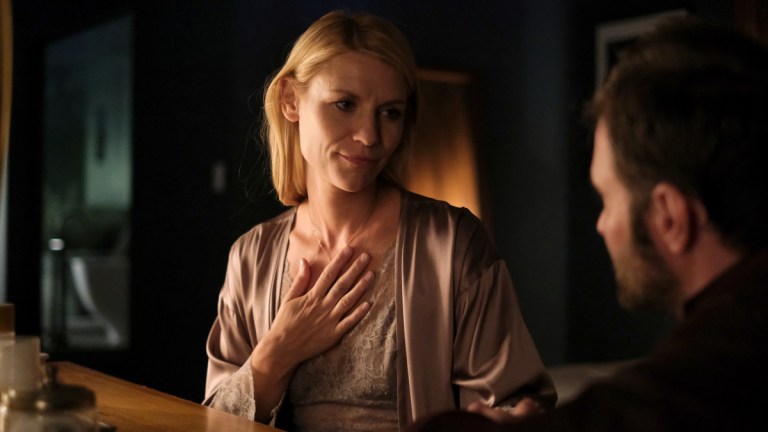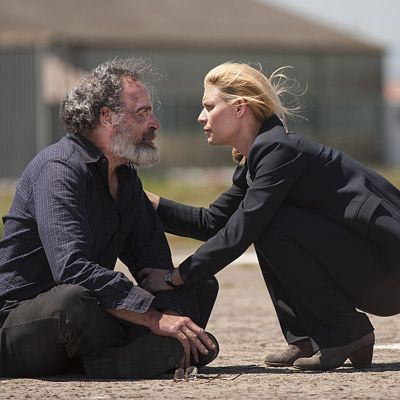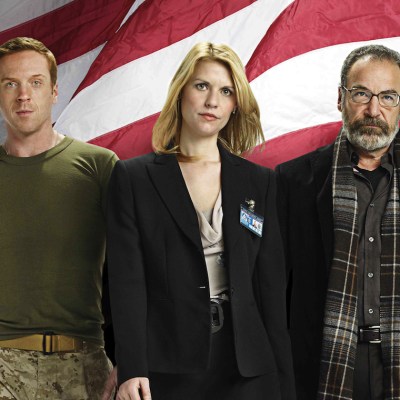Homeland Series Finale Ending Explained
We examine the last full measure Carrie gives to serve her homeland… even after she’s forsaken it.

This article contains major Homeland series finale spoilers.
Her eyes are not smiling. On the cover of Carrie Mathison’s book, her tell-all about the apparent wickedness of the United States government, she is not smiling. In fact, she looks downright despondent in the black and white photograph above the title, Tyranny of Secrets, and in the first image “Professor Rabinow” has seen of his protégé in years. Is this what Carrie has been reduced to, the poster child of Russian propaganda against the country she sacrificed everything to serve?
That at least appears to be the initial takeaway from the epilogue of the Homeland series finale. Set two years after the rest of the events of the episode, our closing movements with Carrie are not in some far flung war zone or in the D.C. beltway’s backyard, idyllically watching her daughter grow up. Instead Carrie’s apparent vision of peace is to be the prized penthouse canary in Yevgeny Gromov’s gilded cage. Before we see her book, we’re teased of its existence when Yevgeny cheerfully surprises his girlfriend (or wife?) with a present.
It’s for “finishing it,” Yevgeny says. “You’ve done a very, very important thing, Carrie,” he coos like a father proud of his child’s report card. “Let’s celebrate.” And so they do, we see Carrie dolled up and actually looking happy—arguably for the first time since Nick Brody was alive—getting ready for a night out on the Moscow town, which includes a jazz concert by Kamasi Washington. His wailing saxophone echoes the Homeland opening credits, and the decidedly American roots Carrie left behind.
Of course this is a deception. Two years after she utterly and thoroughly betrayed her mentor and last living friend, Saul Berenson, Carrie has taken on the responsibility of the Russian asset she burned. Anna Pomerantseva, apparently the CIA’s last active asset inside the Kremlin, was so thoroughly betrayed by Carrie in an attempt to prevent nuclear war that the best case scenario for Anna became committing suicide rather than a tortuous death at the hands of the Russian GRU. As Saul explained in his video message to Carrie from even further years back, other than Carrie, Anna was the most important professional relationship of his career, and the bravest woman he’d ever known.
By giving this visibly strong woman to the Russians (not to mention handing a paralyzed Saul over to would-be Russian assassins), Carrie really did what the subtitle of her memoir states, “Betrayed My Country.” She did it so thoroughly, she even wrote the book about it, further insulating herself as a prized puppet inside the Russian government—which she is apparently using as a perch to continue Anna’s work.
Just on its surface level, it’s a profoundly bittersweet ending. Carrie will repair her relationship with Saul, even as she’ll likely never see his face again, by becoming that brave woman she gave up. She sacrificed one life to save thousands in Pakistan, and will become Saul’s last eyes and ears in a government that is still clearly hostile to the U.S., both in the fictional world of Homeland and in our own (although at least Saul doesn’t have to worry about a POTUS willfully turning a blind eye to election meddling, eh comrade?).
Realizing that he has not lost Carrie forever, Saul’s eyes sparkle even as his wounded grimace stays unmoved. Carrie meanwhile smiles on Yevgeny’s arms, even as her eyes weep in the series’ closing image. However, the significance of this ending is about more than the plot machination of Carrie making amends for betraying Saul. Rather the ending of Homeland comes full circle and comments, one last time, on the era of espionage that defined the Showtime series.
Debuting in October 2011, Homeland came of age during the first term of President Barack Obama. Less than half-a-year before its premiere, Osama bin Laden was killed in a Pakistani compound, and the U.S. collectively had begun trying to turn the page on the War on Terror. To turn the page on the fear and paranoia that scarred the Bush years following Sept. 11, 2001 and which led to disastrous foreign policy with an endless war in Afghanistan and another (needless) war in Iraq.
The horrors and ghosts of that era are not so gently unearthed by the Homeland series finale. In order to write her condemnation of American foreign policy for her new lovey-dovey Russian handlers, Carrie has plastered on the walls of her cluttered office fictional scandals in Homeland’s universe, like a “Circle of Corruption in the Oval Office” article about the brief tenure of President Elizabeth Keane, as well as real dark chapters in America’s War on Terror history, such as the tortures and humiliations of Abu Ghraib prison. Meanwhile neocon John Zabel is still making excuses to Saul Berenson about invading Iraq under false pretenses.
Much of Homeland Season 8 is about confronting the legacy of the War on Terror, and thus the legacy of Carrie Mathison. The central conflict that leads Carrie Mathison to sacrifice her life, daughter, and even her public record involves a potential nuclear war on the Afghan-Pakistani border. In essence an inexperienced and feckless president named Ben Hayes is preparing to invade a Middle Eastern country because of an inaccurate assumption about that nation’s culpability in a terrorist attack… not unlike President George W. Bush insisting that there was a tangible connection between the Saddam Hussein regime in Iraq and the al-Qaeda terrorist network who hit us on 9/11.
This fictional recreation of America’s original 21st century sin is asking if Americans can really learn from their past mistakes, and if Carrie can live with her own culpability. The alleged autobiography she’s written to cement her cover looks like something from Edward Snowden’s own playbook: a self-justifying memoir that revels in the U.S. government’s mistakes in a post-9/11 world that treats the U.S. as, ultimately, the boogeyman. But that’s never been Carrie’s actual point-of-view, nor Homeland’s.
She’s a patriot who is psychically scarred by the events of a fateful morning in September 2001, which has indeed caused her to have innocent blood on her hands, and more than just Anna Pomerantseva’s. In season 4, which the final season also revisits the wounds of, Carrie became the “Drone Queen” of the CIA Kabul station. She surely sanctioned the killings of hundreds of Taliban and al-Qaeda fighters and prevented attacks on American soldiers and Afghan civilians, but she also sanctioned the killings of civilians herself—more than a hundred of them at a wedding. This was obviously based on foreign policy that outlived the Bush administration and occurred after Obama attempted to turn a page on the post-9/11 world.
But there never was a page to be turned. Not for Carrie, not for Saul, and not for the intelligence officers who Homeland reveres for walking into the fog and never returning during the last two decades. In 2020, and after a new paradigm-shifting global event like the coronavirus pandemic, it seems almost bizarre to think that there is still a sign in the bowels of Langley that reads, “Every day is September 12th,” but for nearly 20 years that has been the impetus for people like Carrie and Saul, who operate on finding a net good in their world to justify “the cost of doing business.”
As we were introduced to her during the season 1 opening credits, Carrie said, “I missed something once and I won’t, I can’t, let that happen again.” Such a specific worldview defined Carrie’s life and, in her own way, has brought her full circle with Nicholas Brody. As the opening sequence of the Homeland series finale reminds us, Brody saw himself as a patriot without a home. He went to war in Iraq but never really came back, even if he was freed from al-Qaeda imprisonment following eight years of torture and brainwashing. Homeland began by taking account and early reflection on the scars left by those initial bad decisions from the War on Terror.
It now bookends that consideration by placing Carrie Mathison, the spy who both loved and broke Brody, in a mirror situation. She is a stranger in a strange land, and who has written a literary version of Brody’s own suicide video: a seeming self-justification for betraying her country. But like Brody before his final ignominious death in Iran, such dissatisfaction became a lie to better serve her country. By disgracing herself and her nation, she can continue to fight a War on Terror that never ended for her and now never will.
In that sense, Carrie, and now Saul as her suddenly unretired handler, is still as much a prisoner of the War on Terror as Brody was until the day he died. There was no figurative coming home for Brody, and there will likely be no literal homecoming for Carrie or Saul. No retirement under their own fig tree.
While it makes a visible gesture to reckon with America’s mistakes over the last 20 years after being so wounded on 9/11, the Homeland finale is a paean to the Americans who gave everything in the days after the towers fell and continue to do so. Much the same way that Saul is still fighting the Cold War by protecting Anna Pomerantseva, Carrie is forever paying the price for fighting an allegedly over War on Terror by sacrificing her freedom to Yevgeny, to the Kremlin, and ultimately to an American public that will likely see her as a traitor. A public that includes a generation that grew up well past the paranoia inflicted by those dark days, including Carrie’s estranged daughter.
In the end, it’s actually a very optimistic and patriotic ending, allowing viewers to imagine Carrie giving her last full measure for decades, one mailed book at a time. She’s the spy who never came in from the cold. One we should be glad someone is still staying tuned to.


